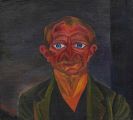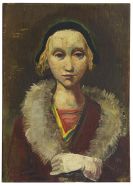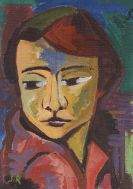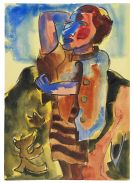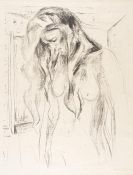
Max Beckmann
Leipzig
1884 -
New York
1950
The German painter Max Beckmann was born in Leipzig on February 12, 1884. Against strong opposition from his family, he pursues a career as an artist. His application at the Dresden Art Academy is turned down, however, he is accepted into the Weimar Saxon-Grand Ducal Art School as of 1900. The En plein air painting which is taught there, geared at French Impressionism, makes the academy one of Gemany's most progressive art schools. Among his teachers is the Norwegian painter Carl Frithjof Smith.
He goes to Paris in 1903 to study at the private Académie Colarossi. The paintings originating from those days in Paris were almost entirely destroyed by Beckmann.
As of 1904 he lives in Berlin. In 1906 he shows works at the exhibition of the Berlin Secession in Weimar and is awarded the honorary prize of the German Artists Union, which grants him a scholarship at the Villa Romana in Florence. Beckmann joins the Berlin Secession in 1907, in 1914 he is a founding member of the Free Secession, as he is a strong advocate of German Impressionism.
World War I has a decisive impact on Max Beckmann's work. As a volunteer paramedic he is touched by what he sees at the front so deeply that he suffers a mental breakdown and is suspended from military service.
He changes his style from Impressionism to Expressionism around 1916, the painting style more and more serves the purpose of the content. A characteristic feature is Beckmann's critical and ironic approach. The content of his pictures, that are charged with a subjective symbolism, becomes more cryptic and complex.
His artistic breakthrough comes in the 1920s. Numerous exhibitions take place in big cities all over Europe. The gallery owners Israel Ber Neumann, Günther Franke and Peter Zingler represent him. Reinhard Piper publishes several books illustrated by Max Beckmann. The first extensive monography is released in 1924.
He teaches a master class at the Frankfurt Städelschule in 1925. A large retrospective takes place at the Mannheim Kunsthalle in 1928. Max Beckmann is awarded the "Reichsehrenpreis Deutscher Kunst" (Honorary Prize of German Art) and receives the gold medal of the city of Düsseldorf for the painting "Großes Stillleben mit Fernrohr" (Large Still Life with Telescope) from 1927.
His meteoric success is suddenly interrupted when the National Socialists take over power in 1933. Beckmann is suspended from the Städelschule. The Beckmann hall in the Kronprinzenpalais of the National Gallery is emptied, a planned exhibition in Erfurt is cancelled. Max Beckmann is stigmatized as a degenerate artist, he flees to Amsterdam in 1937.
He takes on a post at the Washington University Art School in St. Louis in 1947 and teaches at the Art School of the Brooklyn Museum in New York as of 1949.
Max Beckmann dies in New York on December 27, 1950.
Would you like to sell a work by Max Beckmann?
Infos for seller

